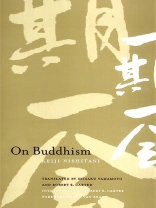Six lectures by eminent Buddhist thinker Keiji Nishitani reflecting on Buddhism for the modern world.
On Buddhism presents the first English-language translation of a series of lectures by Keiji Nishitani (1900–1990), a major Buddhist thinker and a key figure in the Kyoto School of Japanese philosophy. Originally delivered in the early 1970s, these lectures focus on the transformation of culture in the modern age and the subsequent decline in the importance of the family and religion. Nishitani’s concern is that modernity, with its individualism, materialism, and contractual ethics, is an insufficient basis for human relationships. With deep insight into both Buddhism and Christianity, he explores such issues as the nature of genuine human existence, the major role of conscience in our advance to authenticity, and the needed transformation of religion. Nishitani criticizes contemporary Buddhism for being too esoteric and asks that it ‘come down from Mt. Hiei’ to reestablish itself as a vital source of worthy ideals and to point toward a way of remaining human even in a modern and postmodern world.
Daftar Isi
Foreword
Acknowledgments
Introduction: On Buddhism
Part One: On What I Think about Buddhism
1. The ‘Inside’ and ‘Outside’ of a Religious Organization
2. Opening Up the Self to the World
Part Two: On the Modernization of Buddhism
3. What Is Modernizaton?
4. A Departure from the ‘Individual’
Part Three: On Conscience
5. In Support of Human Relations
6. To Make Sure of Oneself
Glossary of Japanese Terms
Index
Tentang Penulis
Seisaku Yamamoto is Professor Emeritus of Philosophy at Kyoto University, Japan. Carter and Yamamoto are cotranslators of Watsuji Tetsuro’s Rinrigaku: Ethics in Japan, also published by SUNY Press. Robert E. Carter is Professor Emeritus of Philosophy at Trent University, Canada. Robert E. Carter is Professor Emeritus of Philosophy at Trent University, Canada. Carter is the author of Encounter with Enlightenment: A Study of Japanese Ethics, both also published by SUNY Press.







![Sampul Brian Schrag & Julisa Rowe: Community Arts for God's Purposes [Chinese] 貼近神心意的社群藝術 Sampul Brian Schrag & Julisa Rowe: Community Arts for God's Purposes [Chinese] 貼近神心意的社群藝術](https://static.worldofdigitals.com/thumb_webp/740/9781645083740.webp)




